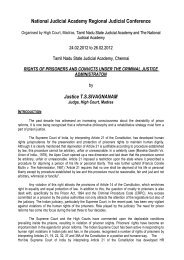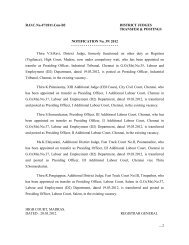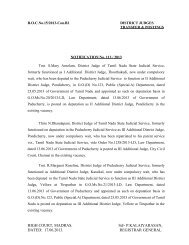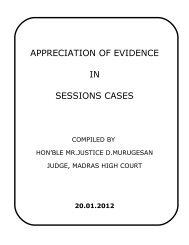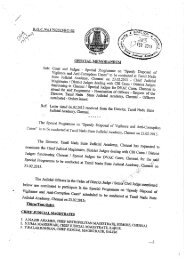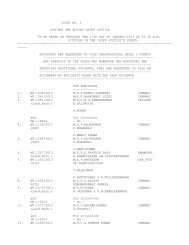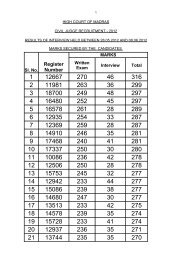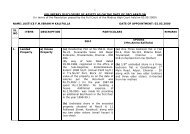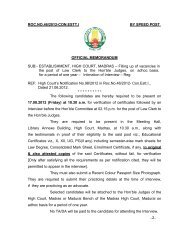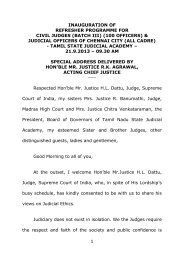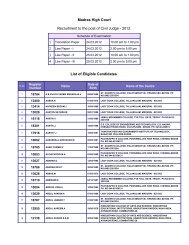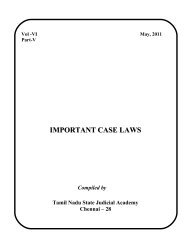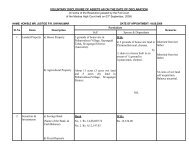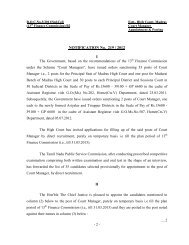May - Madras High Court
May - Madras High Court
May - Madras High Court
You also want an ePaper? Increase the reach of your titles
YUMPU automatically turns print PDFs into web optimized ePapers that Google loves.
Under Section 16 legitimacy of the child is determined on the basis of marriage, whether valid or void or<br />
voidable.<br />
Section 16 does not deal with the rights of children born through concubinage, but deals with legitimacy of<br />
the children born through void or voiable marriage.<br />
Concept of acknowledgment of paternity available in Mohammedan Law, cannot be imported to Hindus –<br />
To attract Section 16 of the Act, there should be a marriage.<br />
Both plaintiff and his second wife, have deposed that there was no marriage, when the child was born.<br />
Intention of the legislature in engrafting a rule of legal fiction in ordaining the children, though illegitimate,<br />
to be treated as legitimate, is confined only to a case, where there is a void or voidable marriage and not in the<br />
case, where there is no marriage at all – It is also settled legal position, while interpreting a provision, the <strong>Court</strong><br />
cannot re-legislate on the subject against the will expressed in the enactment.<br />
Both the <strong>Court</strong> below have erred in applying Section 16(1) of the Hindu Marriage Act, in declaring the<br />
legitimacy of the child born to the plaintiff and KM, not through a wedlock and during the subsistence of the first<br />
marriage of the plaintiff.<br />
2012-2-TLNJ 197 (Civil)<br />
Thulasi Ammal and Ors<br />
Vs<br />
A. Sivakumar and Ors<br />
Civil Procedure Code 1908 as amended, Section 3(1) – Suit for partition – plaintiffs claimed share on the<br />
property already sold to one of the defendants on the allegation that sale is not valid – trial court preliminary decree<br />
for partition – on appeal the defendant contended that the suit was bared by limitation and was not considered by<br />
trial court – the <strong>High</strong> <strong>Court</strong> expressed that the office of the trial court must be more vigilant and act as a sentinel<br />
quivive to check every suit before it is within the period of limitation as contemplated under the act and place a<br />
report before the trial judge when it is admitted and felt that nowadays courts not following the procedure (para 43)<br />
– further held that plea of limitation can not be raised at the appellate stage when not raised in trial court – but held<br />
that alleged sale is valid and binding and made to clear family debts – (para 67) plaintiff not entitled to question the<br />
same – Appeal Suit allowed with regard to certain items of properties.<br />
2012 (3) CTC 205<br />
K. Manoharan<br />
Vs<br />
T. Janaki Ammal and Ors<br />
And<br />
T. Janaki Ammal and Ors<br />
Vs<br />
K. Monoharan and Anr<br />
Specific Relief Act, 1963 (47 of 1963), Section 16(c) – Suit for Specific Performance – Total Sale<br />
consideration fixed as 42,66,000/- - Amount of 25,00,000/- paid as advance – Balance of 17,66,000/- to be paid<br />
within 21/2 months from date of Agreement – Purchaser has to prove his continuous readiness and willingness to<br />
perform his part of contract from date of contract till date of hearing – Mere pleadings is not enough – Purchaser<br />
had paid 25,00,000/- as advance and deposited balance sale consideration of 17,66,000/-, on date of filing of<br />
Suit itself – It cannot be stated that purchaser was not ready and willing to perform his part of contract – Purchaser<br />
was always ready and willing to perform his part of contract – He is entitled to decree for Specific Performance.<br />
13



